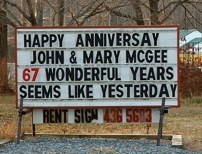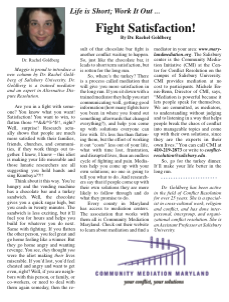
Group, Family, and Interpersonal Mediation Services
Dr. Goldberg has co-founded one and directed two mediation centers, and has over 25 years experience leading, teaching, and training in mediation skills and techniques.
What is mediation?
Because the people in the conflict craft their own solutions with the help of a mediator, they find highly satisfying and long lasting solutions that meet their exact needs.
Because the process is so responsive to the needs of the people involved, it can be a forum where people get very clear about their options and why to choose one versus another, where they can be honest without further harming each other, where they can come up with creative solutions that meet their needs, and can repair or improve strained relationships.
Why is mediation so effective?
Research tells us that people in a conflict are most satisfied when they create their own solutions through negotiation. However, some conflicts are so painful, long standing, or difficult that it is impossible for the people involved to negotiate without assistance. Mediators can assure a safe, sane process and use their unique skills to help parties break through, sometimes extraordinary circumstances and histories to find common ground and real solutions. Often mediation reveals the real issues that were previously hidden, leading to results that are more satisfying and durable than other processes. As the parties, with the help of the mediator, create their own solutions, people tend to keep their agreements and follow through on their commitments.
What kinds of cases do not belong in mediation?
Mediation is what is called ‘facilitated negotiation’ so if the people involved are completely unwilling to compromise, they will have a lower likelihood of reaching a satisfactory agreement.
Unlike court, there is no one advocating for you, so people who are unable to advocate on their own behalf, like children, those under the influence of drugs, or mentally impaired adults, who cannot negotiate on their own behalf, cannot mediate.
Rights cases - if you believe you have been wronged in a way that violates your rights and want to make sure such a thing never happens to anyone again - court is the place to set nation-wide precedents.
Is mediation confidential?
Yes, anything said in a mediation session is confidential. The mediator tears up her notes after the mediation, and no record is kept unless you come up with a signed agreement. In that case, a copy of the agreement is kept in our files.
Is the mediation agreement binding?
No one is ever forced to come to an agreement in mediation. However, if the parties come to an agreement, and sign it, it is a legal contract, binding like any other legal contract.
How long does it take?
Most mediations take one or two, two-hour sessions.

The mediator explains the process, his or her role in assisting the parties, and leads them through a process where everyone get a chance to be heard in a way that helps everyone understand both the obvious and deep-rooted causes of the current problems. The mediator then supports the people involved to come up with solutions that benefit everyone involved to the extent possible, that are realistic, efficient, durable, and fair. Most mediations end in an agreement that is signed by both parties.
Does the mediator make the decision for us?
No. The mediator helps you come up with your own solutions.
How much does mediation cost?
We charge between 50 and 100 dollars an hour per person, depending on the size of the group and the task involved, or 1,200 dollars a day for full-day service, which includes all prep and follow up work. However, each case is individually tailored to your needs, including negotiating a budget for your particular case.
Is mediation voluntary?
Mediation is completely voluntary for both you and ourselves. If at any point you wish to stop, you may do so. And, although this is rare, if we feel that mediation is not working for your case, we will stop the mediation and refer you to a more appropriate setting.
How many people can be involved?
Mediation can involve two individuals, families, groups, or nations. For larger multi-party mediations it is often necessary to have representatives for groups to make the negotiating body a manageable size, but mediation can be used in conflicts of any size and complexity.
How can I get more information?
Please contact us for more information, or for a free consultation.
